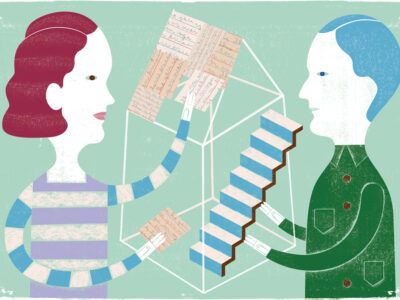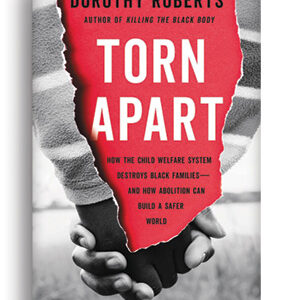On May 29, top family sociologists from around the country gathered at Penn for a conference that was also a celebration. The day began early with mini Danishes and cubed melon in Claudia Cohen Hall, but quickly moved on to more serious business. In a morning session, Harvard’s Kathryn Edin presented a paper on how relationships between divorced or separated parents are mediated through their children. After lunch Annette Lareau, the Stanley I. Sheerr Term Professor in the Social Sciences, talked about class differences in the ways families prepare their children for life after high school.
Front and center among the 140 or so attendees was Zellerbach Family Professor of Sociology Frank F. Furstenberg, who said that in the days leading up to the conference he was so excited he could barely sleep. The event was Furstenberg’s own, a retirement party centered on the issues and populated with the people that have filled his more than 40-year career [“A Sociologist Hits Home,” May 1987].
At 70, Furstenberg remains an unusually enthusiastic person. His first and most enduring research interest came to him almost by happenstance, through his mother (who is 99 and doing well, which makes Furstenberg optimistic about his chances for a long and productive retirement). In the 1960s she was a social worker at Sinai Hospital in Baltimore and enlisted her son to help the hospital evaluate a pilot program for teenage mothers.
That launched the Baltimore Study, a landmark longitudinal investigation of the consequences of teenage childbearing for mothers and their children that eventually spanned 30 years. Furstenberg emerged as a leading voice on teenage parenthood just as the issue was becoming national shorthand for urban poverty and family decay. His 1976 book Unplanned Parenthood: The Social Consequences of Unplanned Parenthood brought him to the top of the maturing field of family sociology. In its pages he described teenage parenthood as a singularly disruptive event that resulted in all manner of adverse life outcomes, from decreased earning power to increased rates of divorce.
The book also won Furstenberg a measure of political notoriety and a brief entry to the world of activism; in the early 1980s, he skirmished with the Reagan Administration in The New York Times op-ed pages over his research.
Yet though Furstenberg is an unabashed lefty in his private life, the evolution of his thinking on teenage parenthood went on to rile many of his like-minded colleagues. While the negative consequences of teenage parenthood are a matter of dogma for liberals and conservatives alike, Furstenberg ultimately abandoned the position. Follow-up interviews with the original cohort of teen mothers revealed that the negative outcomes he’d measured initially were endemic to the population of poor, urban blacks as a whole—not the unique consequence of early pregnancy. It was a startling conclusion given the moral and political narratives that had developed around the issue. “Some of my colleagues were sort of upset,” Furstenberg recalls. “As if I’d switched teams.”
“If you’re a social scientist, you really have to discipline those [political] passions,” he adds. Asked whether he considers himself an activist, he pauses a moment and replies, “I consider myself an academic activist, which is a bit different.”
A willingness to challenge conventional wisdom has continued to mark his work. Furstenberg’s more recent research has focused on what family sociologists refer to as the “transition to adulthood”—a process whose duration has expanded of late. Opinion makers in the media, he notes, have tended to caricature the dependent twenty-something as an overgrown adolescent with an allergy to responsibility. On the contrary, he argues, the milestones that have traditionally marked entrance into adulthood—complete education, financial independence, ability to support a family—are more difficult to attain now than at any time in the past, almost necessitating parental support in the years after college. As his title of a 2004 paper puts it, with a note of sympathy, “Growing Up is Harder to Do.”
In the 42 years Furstenberg has been at Penn, he has seen the social sciences evolve dramatically. “If I go back to when I was being trained, there was a lot of talking about society writ large,” he says. But sweeping statements and broad judgments have a smaller place in academics today, where research methods have been codified, fidelity to hard data is ascendant, and specialization is the norm.
Some sociologists of Furstenberg’s generation lament, as he puts it, “that we’ve gone from a field of big ideas and big ambitions to narrow little silos of work.” It’s a complaint that has a place in Furstenberg’s heart, if not in his head. He tells a story about being in Baltimore and almost feeling physically sick as he drove across to his parents’ affluent neighborhood from the home of a teenage mother. “I thought, these two worlds are just completely disconnected,” he said.
In moments like that, the urge to throw off the garb of academic reserve and grab the activist’s bullhorn is no doubt tempting. But Furstenberg believes the tempering instinct has left his field immeasurably stronger than when he arrived. “You can’t make your data come out the way you want it to,” he said, “and you can’t make the world come out the way you want it to. That has always been my mandate and mantra.”
—Kevin Hartnett




